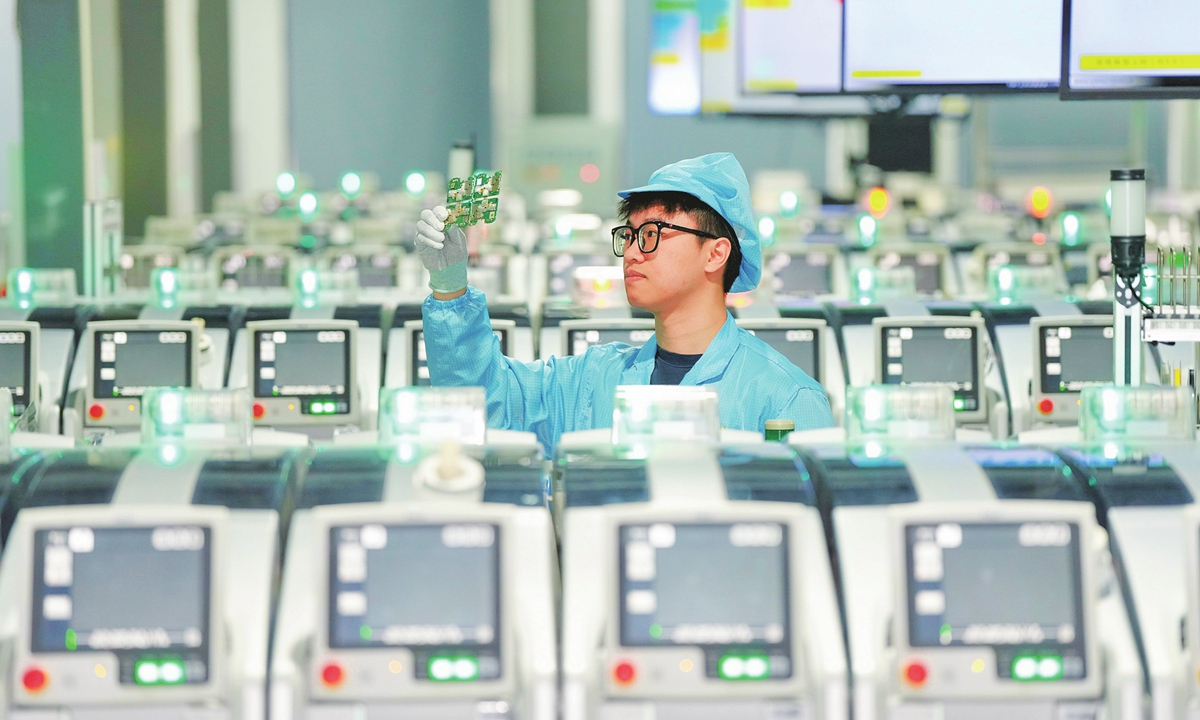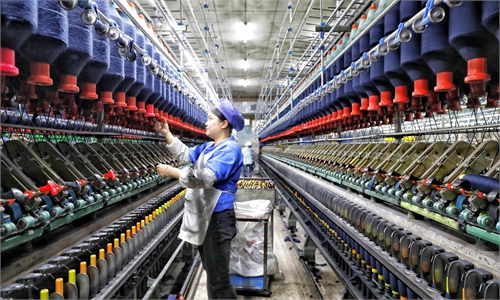China’s commitment to innovation shines bright on quality development: Nobel laureate Edmund Phelps


An employee inspects a cellphone chip at an electronic product research and development company in Ningbo, East China's Zhejiang Province on February 22, 2024. The company's products are exported to more than 80 countries in Europe and Latin America, and its overseas order book is full through the second quarter of 2024. Photo: VCG
Editor's Note: China's economy is undergoing a critical transformation toward quality growth. During the process, there are many pessimistic views from Western media about China's economy. However, China has maintained stable growth despite challenges and reaffirmed its commitment for promoting innovation and high quality economic development. How should we objectively observe China's economic transformation? Nobel Laureate, Professor Edmund Phelps, author of books Mass Flourishing: How Grassroots Innovation Created Jobs, Challenge, and Change and The Logic of Growth, shared his perspective with the Global Times.GT: China's economy is undergoing a critical transformation toward quality growth. How do you perceive the role of innovation in China's economic growth?
Phelps: The generation of innovation is the main driving force behind China's economic transformation and upgrading. For China's economy to further the transition toward high-quality development, there is nothing more important than achieving a higher level of independent innovation.
China used to produce products innovated by other countries, but that has changed with the emergence of corporate giants like Alibaba, Tencent, and ByteDance. China has achieved admirable innovation-driven development in both emerging and traditional sectors including finance, artificial intelligence, and bio-tech.
Currently, China's independent innovation keeps improving for a few reasons. First, Chinese enterprises are actively studying foreign products and methods, which inspire them to create new products and methods. Second, with the increase in wage levels, Chinese exporters need to develop new products and technologies in order to survive. Third, the level of education has increased, allowing more people to benefit from the new economy. Fourth, local governments have become more supportive of policies that support independent innovation.
GT: The growth of exports of the "new three items" in China's foreign trade has surpassed 1 trillion yuan in 2023. China has cultivated around 400,000 high-tech enterprises. China's number of intelligent factories ranks first in the world. How do you view these breakthroughs? How do you view China's progress and advantages in promoting innovation?
Phelps: For a long time, people have believed that sustained growth and development require continuous innovation. Since the reform and opening-up, China's innovation mainly relied on imports, but in the past decade, independent innovation has become very important. China can introduce foreign innovative products at an acceptable cost, but it should also shift its focus toward independent innovation.
In recent years, it has been crucial to shift from "Made in China" to "Innovated in China." This kind of technological progress is needed to enhance productivity and consequently increase wage levels. No one can predict the contributions of leading innovative Chinese enterprises to the global economy, but I believe they will make significant contributions to the global economy.
There is evidence now that a large number of Chinese people have the ability to innovate. Data on independent innovation in China and G7 countries show that China was already ranked fourth in the 1990s. In the following decade, the rankings of the UK and Canada declined, with China rising to second place, not far behind the US.
Currently, innovation from the US is much less than it was in the past, and there is almost no innovation coming from Europe. Therefore, China can become a major source of global economic innovation. This is a valuable opportunity for China to become a major leader in innovation.
GT: The 2024 Government Work Report is sending an important signal for high-quality development, emphasizing the acceleration of the development of new quality productive forces, actively nurturing emerging industries and future-oriented industries, as well as deepening the promotion of innovation and development in the digital economy. How do you view China's commitment and potential in promoting innovation?
Phelps: China is currently making many high-tech innovations, and continuing to strive in this area is a wise move for the country. As time goes on, we will see what progress China makes in this regard.
China has taken various measures to promote innovation and entrepreneurship, such as significantly reducing the procedures for establishing new companies, building numerous schools, and facilitating the entry of foreign professionals into China. Equally important is China's recognition of the importance of allowing competition in the economy. There is clear evidence that China is moving toward the path of entrepreneurship and innovation. The government has reiterated its determination to protect new patents and it is well known that China registers a considerable number of new companies every week.
GT: How can China further unleash its innovative potential to boost its economy?
Phelps: If China wants to achieve great economic flourishing, it must provide extensive opportunities for innovation. The obstacles faced by China, the US, and Europe are the same. In order to continue driving economic growth and achieving mass flourishing, we need to address some fundamental issues, such as how to mobilize mass innovation and how to enable people to achieve self-development.
China needs to accelerate its pace of independent innovation by:
Cultivating entrepreneurs, who will find the direction for business development in a world full of uncertainty and use their abilities to solve new problems.
Cultivating innovative companies, which require imagination, curiosity, and deep insight into new trends.
China needs to change its perception of independent innovation. Innovation does not end with the conception of new products or methods; it requires the widespread application of these new ideas into commercially viable products or methods.
To achieve large-scale innovation, China needs to provide a suitable environment of incentive, establish necessary systems, and remove barriers to innovation. Only when the people are energetic can innovation occur, and the national economy can develop.
To achieve faster development, China needs to cultivate more scientists, and these scientists need to apply their research to the creation and commercialization of new products and methods. This is essential for increasing productivity.
GT: Some media claim that China's economic growth is peaking, how do you view such opinions? Do you have confidence in China's economic prospects?
Phelps: Since the reform and opening-up, China has improved productivity and wage levels in multiple dimensions. In the coming years, China will further enhance productivity and wages through grassroots innovation. As more Chinese people engage in innovation, the inclusiveness of the Chinese economy will inevitably expand, leading China toward economic prosperity.
China can certainly achieve a high level of economic prosperity through independent innovation. Almost the entire world is facing a shortage of innovation capabilities, with some countries experiencing this for decades. Most countries have not found a way out. Now, China is taking the lead in the path of mass innovation.
GT: China's capacity to educate and attract human capital keeps improving, with the largest number of STEM graduates. How do you perceive this advantage contributing to the promotion of innovation?
Phelps: The current wage growth level in China has already been able to meet people's basic material needs. People are beginning to highly value whether they are in an environment full of innovative spirit, and they are starting to pursue a sense of achievement through innovation. By shaping a vibrant innovative environment that stimulates people's minds to think about a series of new issues, China will become a world leader in innovation.



